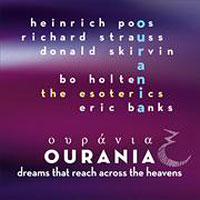In Celebration of the Human Voice - The Essential Musical Instrument
Home | Doo Wop | Barbershop | World | Contemporary | Christian | Vocal Jazz | Choral | Christmas | Instructional | Arrangements
Classical | Opera | Musicals | Personality | Young Singers | Disney | Videos | Songs | The Artists

Esoterics
Ourania - Dreams that reach across the heavens
 |
|
Directed by Eric Banks
In OURANIA: Dreams that reach across the heavens, The Esoterics features eight choral works that explore the concept of 'the heavens.' Named for the Greek muse of astronomy, OURANIA ranges in scope from the precise calculations of science, to the lavish polyphony of late Romanticism, and the angelic inspiration of Biblical imagery - offering several perspectives on how we have come to understand the sun, moon, and stars. Included in this recording are Richard Strauss' 16-part choral tone poems Zwei Gesange (Two songs) (Op 34): Der abend (The evening), Friedrich von Schiller's description of Phaebus Apollo, whose chariot draws the sun to setting; and Hymne, Friedrich Ruckert's proclamations of celestial ecstasy, in which the heavens join Jacob as he celebrates the return of his prodigal son. Also featured on this recording are two works by The Esoterics' founder Eric Banks, and these highlight the intersection between the hard science of astronomy (Banks' course of study while at Yale) with music. In his Onomata planeton, a choral intonation of the planets and moons in the solar system, the score is based entirely on the comparative mass, velocity, and period of revolution of these heavenly bodies. Banks' second piece, Tabula siderum zodiaco, draws a similar parallel between music and astronomy, as he chorally maps the 928 stars of the zodiac, by superimposing the twelve constellations of the zodiac upon the twelve key signatures of the "circle of fifths." |
| Item code: 6010C | 1 CD | $15.95 |
| Choral | A Cappella | Mixed | United States |
